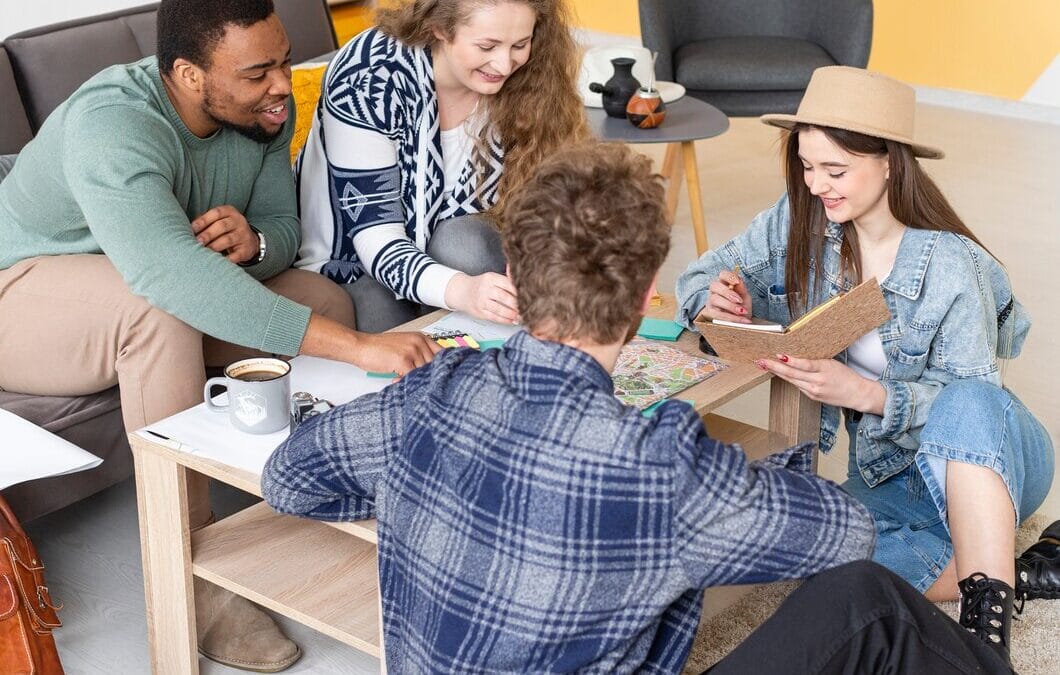Building friendships is a crucial part of a child’s development. Peer socialization groups play an essential role in helping kids learn how to connect with others and develop lasting relationships. At Watch Me Shine, we understand the importance of creating a supportive environment where children can practice social skills and make new friends.
Socialization groups are designed to bring kids together in a friendly setting where they can interact and engage in various activities. These groups help children who might struggle with social skills or feel shy about making new friends. By participating in these groups, kids learn how to communicate, share, and cooperate with their peers.
Engaging in group activities isn’t just about having fun. It’s about teaching kids life-long skills that will help them in school, at home, and in social settings. Through guided play and structured interactions, children learn the basics of social interaction, such as taking turns, listening to others, and expressing themselves. This foundation of social skills will greatly benefit them as they grow and face more complex social situations. Peer socialization groups offer a fantastic way for children to build those essential friendships in a safe and nurturing environment.
Understanding Peer Socialization Groups
Peer socialization groups are structured gatherings where children come together to interact in a guided environment. These groups often include kids of similar ages and are supervised by trained professionals, such as speech-language pathologists or occupational therapists. The goal is to create a safe space where kids can engage in play and activities that teach social skills.
In these groups, children participate in various activities designed to promote interaction and communication. Games, group projects, and discussions are common methods used to help kids learn how to connect with others. The activities are fun and engaging, making it easier for children to practice new skills and make friends.
These groups are especially beneficial for children who find social interactions challenging. It could be due to shyness, developmental delays, or other factors. By participating in a peer socialization group, they get the chance to practice social skills without the pressure of more formal settings like school or public events. Over time, this helps them build confidence and become more comfortable in social situations.
Key Benefits of Peer Socialization for Kids
Peer socialization groups offer several important benefits for kids:
- Team Games: Activities like relay races, scavenger hunts, or team sports encourage children to work together. These games help kids learn teamwork, communication, and how to support each other.
- Role-Playing: Pretend play or role-playing can be a powerful tool for social skills. Kids can act out different scenarios, such as ordering food at a restaurant or resolving a conflict. This helps them practice real-life social interactions in a safe space.
- Craft Projects: Group craft projects allow kids to express their creativity while working together. Making a mural or building a group sculpture can teach cooperation and patience. Plus, it’s a great way for kids to bond over a shared activity.
- Storytelling Circles: Sitting in a circle and sharing stories can help children develop listening skills and empathy. Each child can take a turn to share something about themselves, which helps build connections and understanding among the group.
- Cooking Together: Simple cooking tasks like making sandwiches or decorating cookies can be both fun and educational. These activities require kids to communicate and collaborate, fostering a sense of partnership.
These activities aren’t just about having fun—they’re designed to help kids practice social skills in a natural and engaging way. Through these positive interactions, children learn how to build and maintain friendships.
Tips for Parents to Encourage Social Skills at Home
Parents play a vital role in supporting their child’s social development. Here are some tips to help your child practice social skills at home:
- Model Social Skills: Children learn by watching adults. Demonstrate good social behavior by greeting people, making eye contact, and using polite language. Your child will pick up on these cues and mimic your actions.
- Create Social Opportunities: Arrange playdates or family gatherings where your child can interact with others. The more chances they have to practice social skills, the more comfortable they will become.
- Role-Play at Home: Use role-playing to teach your child how to handle different social situations. You can practice things like introducing themselves, asking to join a game, or resolving a conflict.
- Encourage Group Activities: Get your child involved in group activities like sports teams, dance classes, or clubs. These settings provide natural opportunities for social interaction and teamwork.
- Praise Social Efforts: Recognize and praise your child’s efforts to be social. Positive reinforcement can encourage them to keep trying, even if they find social interactions challenging.
- Teach Emotion Recognition: Help your child understand and label their own emotions and those of others. Use books, movies, or real-life situations to discuss how people might feel in different scenarios.
By incorporating these strategies into your daily routine, you can help your child become more comfortable and skilled in social interactions.
Conclusion
Building friendships through peer socialization groups is a rewarding experience for both kids and parents. These groups offer a unique opportunity for children to develop essential social skills in a fun, supportive environment. By understanding the role of peer socialization groups, recognizing the key benefits, engaging in exciting activities, and supporting social skills at home, we can help our children form meaningful connections.
If you’re interested in learning more about how peer socialization groups can benefit your child, reach out to Watch Me Shine. Our dedicated team is here to support your child’s social and developmental needs. Contact us today to see how we can help your child shine!
- Improved Communication Skills: Interacting with other children in a structured environment helps improve communication skills. Kids learn how to express themselves clearly and listen to others, which is crucial for building relationships.
- Enhanced Emotional Understanding: These groups help children recognize and understand their own emotions and those of others. Activities often include role-playing or discussions about feelings, which can improve empathy and emotional intelligence.
- Better Cooperation: Group activities teach kids how to work together towards a common goal. Whether they’re building a tower of blocks or participating in a team game, children learn the importance of cooperation and teamwork.
- Increased Confidence: As kids practice social skills and make new friends, their confidence grows. They feel more comfortable in social settings, which can positively impact their interactions at school and in the community.
- Support for Developmental Needs: For children with developmental challenges, peer socialization groups provide targeted support. Therapists can tailor activities to address specific needs, ensuring that each child gets the most out of their experience.
These benefits extend beyond the group sessions, helping children apply their new skills in everyday life. Peer socialization groups provide a foundation for building strong, healthy relationships that can last a lifetime.
Exciting Activities to Foster Friendships
Peer socialization groups are all about making the process of building friendships fun and exciting. Here are some great activities that help kids connect:
- Team Games: Activities like relay races, scavenger hunts, or team sports encourage children to work together. These games help kids learn teamwork, communication, and how to support each other.
- Role-Playing: Pretend play or role-playing can be a powerful tool for social skills. Kids can act out different scenarios, such as ordering food at a restaurant or resolving a conflict. This helps them practice real-life social interactions in a safe space.
- Craft Projects: Group craft projects allow kids to express their creativity while working together. Making a mural or building a group sculpture can teach cooperation and patience. Plus, it’s a great way for kids to bond over a shared activity.
- Storytelling Circles: Sitting in a circle and sharing stories can help children develop listening skills and empathy. Each child can take a turn to share something about themselves, which helps build connections and understanding among the group.
- Cooking Together: Simple cooking tasks like making sandwiches or decorating cookies can be both fun and educational. These activities require kids to communicate and collaborate, fostering a sense of partnership.
These activities aren’t just about having fun—they’re designed to help kids practice social skills in a natural and engaging way. Through these positive interactions, children learn how to build and maintain friendships.
Tips for Parents to Encourage Social Skills at Home
Parents play a vital role in supporting their child’s social development. Here are some tips to help your child practice social skills at home:
- Model Social Skills: Children learn by watching adults. Demonstrate good social behavior by greeting people, making eye contact, and using polite language. Your child will pick up on these cues and mimic your actions.
- Create Social Opportunities: Arrange playdates or family gatherings where your child can interact with others. The more chances they have to practice social skills, the more comfortable they will become.
- Role-Play at Home: Use role-playing to teach your child how to handle different social situations. You can practice things like introducing themselves, asking to join a game, or resolving a conflict.
- Encourage Group Activities: Get your child involved in group activities like sports teams, dance classes, or clubs. These settings provide natural opportunities for social interaction and teamwork.
- Praise Social Efforts: Recognize and praise your child’s efforts to be social. Positive reinforcement can encourage them to keep trying, even if they find social interactions challenging.
- Teach Emotion Recognition: Help your child understand and label their own emotions and those of others. Use books, movies, or real-life situations to discuss how people might feel in different scenarios.
By incorporating these strategies into your daily routine, you can help your child become more comfortable and skilled in social interactions.
Conclusion
Building friendships through peer socialization groups is a rewarding experience for both kids and parents. These groups offer a unique opportunity for children to develop essential social skills in a fun, supportive environment. By understanding the role of peer socialization groups, recognizing the key benefits, engaging in exciting activities, and supporting social skills at home, we can help our children form meaningful connections.
If you’re interested in learning more about how peer socialization groups can benefit your child, reach out to Watch Me Shine. Our dedicated team is here to support your child’s social and developmental needs. Contact us today to see how we can help your child shine!

